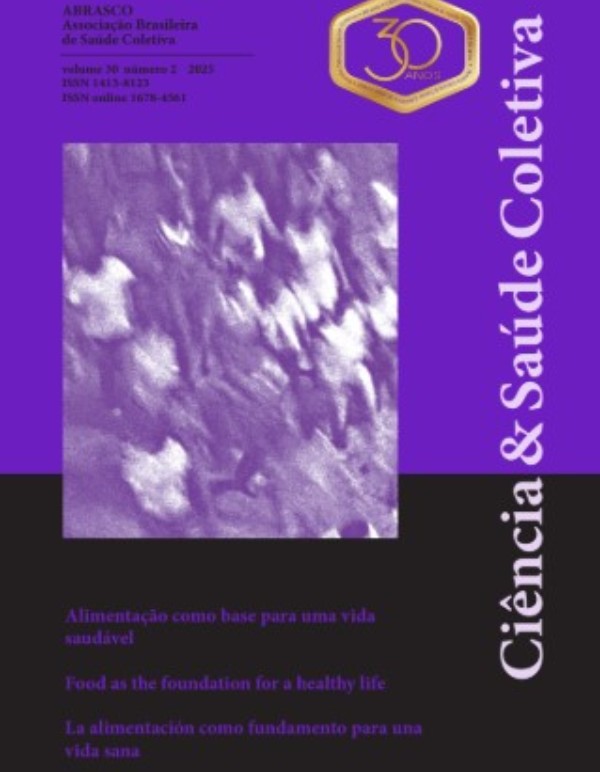0352/2023 - Home office is associated with weight gain during the Covid-19 pandemic: Brazilian population-based studies
Home office está associado ao ganho de peso durante a pandemia de Covid-19: estudos brasileiros de base populacional
Autor:
• Fernanda O. Meller - Meller, F. O. - <fernandameller@unesc.net>ORCID: https://orcid.org/0000-0002-1174-4721
Coautor(es):
• Antônio A. Schäfer - Schäfer, A. A. - <antonioaschafer@unesc.net>ORCID: https://orcid.org/0000-0002-8834-0434
• Bianca Languer Vargas - Bianca, L. V. - <bicalang@gmail.com>
ORCID: https://orcid.org/0000-0002-0984-1215
• Vanise S. F. Viero - Viero, V. S. F. - <vanisedossantos@hotmail.com>
ORCID: https://orcid.org/0000-0002-7780-3595
• Elizabet Saes-Silva - Saes-Silva, E - <betssaes@gmail.com>
ORCID: https://orcid.org/0000-0003-2356-7774
• Micaela R. Quadra - Quadra, M. R. - <micaelarquadra@gmail.com>
ORCID: https://orcid.org/ 0000-0002-6380-7720
• Samuel C. Dumith - Dumith, S. C. - <scdumith@yahoo.com.br>
ORCID: https://orcid.org/0000-0002-5994-735X
Resumo:
Background: The Covid-19 pandemic caused changes in life, affecting habits and behaviors, and one of its consequences is an increase in weight. We aimed to evaluate the association between remote work and weight gain during the Covid-19 pandemic in two cities in southern Brazil.Methods: A population-based cross-sectional study carried out in the southern region of Brazil. Data were collected face-to-face, in households ed by census sampling. The outcome was weight gain, and the exposure was remote working. To verify this association, Poisson Regression was used to calculate the crude and adjusted prevalence ratio and its 95% confidence intervals, using 5% significance level.
Results: In total, 2,152 individuals were interviewed. The prevalence of weight gain during the pandemic was 38.4% (95%CI 36.1-40.7), being significantly higher in those who worked remotely (47.0% vs 37.7, p=0.02). Those individuals who worked remotely were 23% more likely to gain weight during the pandemic compared to those who did not work remotely (PR: 1.23; 95%CI 1.02-1.49).
Conclusions: Health and education services may be encouraged to implement educational actions at the collective level, aimed at enlightening the population and preventing weight gain in periods of confinement.
Palavras-chave:
Covid-19, home office, weight, cross-sectional study.Abstract:
Introdução: A pandemia de Covid-19 provocou alterações na vida, afetando hábitos e comportamentos e uma de suas consequências é aumento de peso. O objetivo foi avaliar a associação entre trabalho remoto e ganho de peso durante a pandemia de Covid-19 em duas cidades do sul do Brasil.Métodos: Estudo transversal de base populacional realizado na região sul do Brasil. Os dados foram coletados face a face, em domicílios selecionados por amostragem censitária. O desfecho foi ganho de peso e a exposição foi trabalho remoto. Para verificar essa associação, utilizou-se Regressão de Poisson para calcular a razão de prevalência bruta e ajustada e seus intervalos de confiança de 95%, com nível de significância de 5%.
Resultados: Foram entrevistados 2.152 indivíduos. A prevalência de ganho de peso durante a pandemia foi de 38,4% (IC95% 36,1-40,7), sendo maior naqueles que trabalharam remotamente (47,0% vs 37,7, p=0,02). Indivíduos que trabalharam remotamente tiveram 23% mais chances de ganhar peso durante a pandemia comparados àqueles que não trabalharam remotamente (RP: 1,23; IC95% 1,02-1,49).
Conclusões: Os serviços de saúde e educação podem ser incentivados a implementar ações educativas em nível coletivo, visando o esclarecimento da população e a prevenção do ganho de peso em períodos de confinamento.













